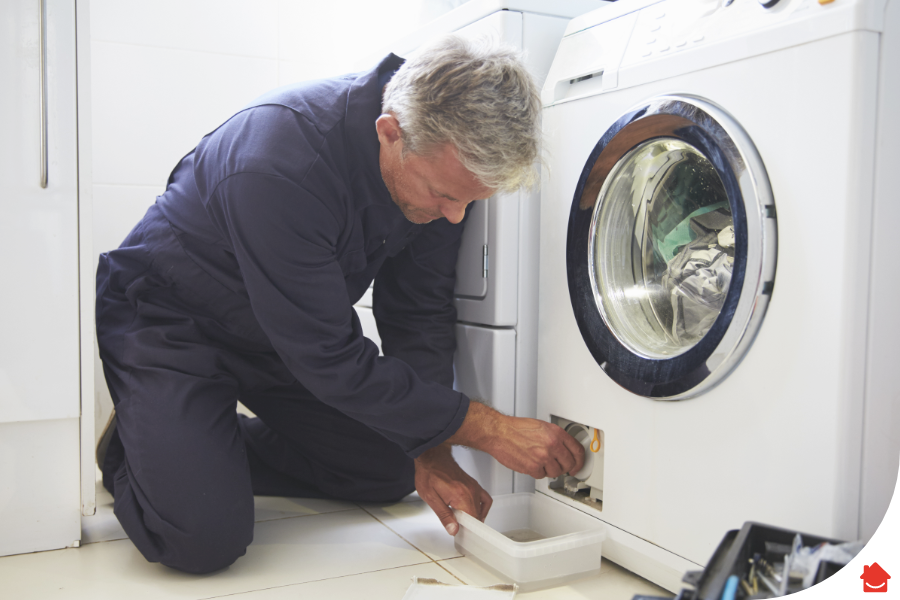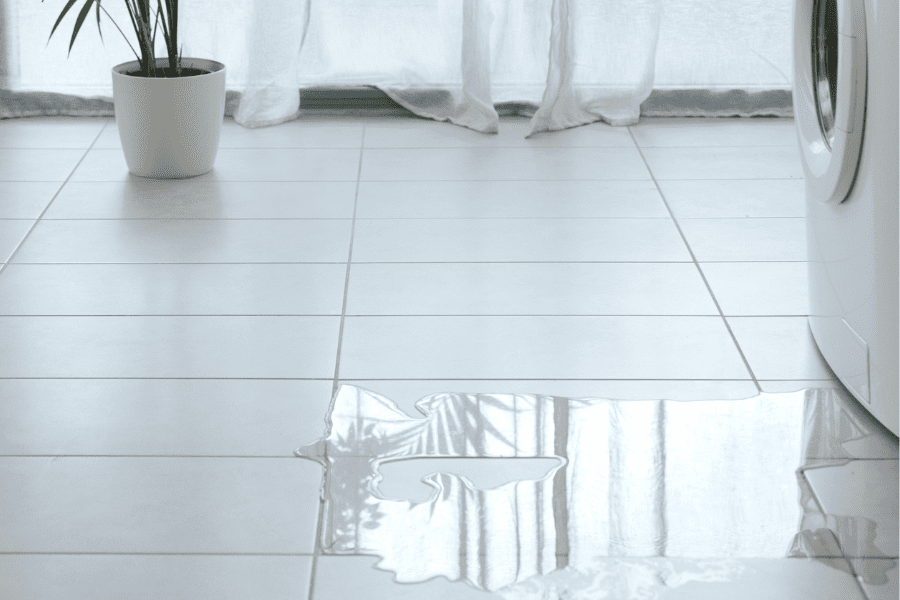Plumbing advice
How do I fix a leaking washing machine?
22 Apr 2021 • 6 minutes


A leaking washing machine can be tricky to diagnose because you might not notice the fault straight away. Water may appear in front of the washer, but the leak causing it is actually around the back. Not to worry! Most washing machine leaks are small, and you may be able to fix them yourself, saving you the hassle, time and money of calling out a professional.
Safety first – before getting started make sure that:
Pull out your washing machine from the wall and check all the hoses carefully. If you find your culprit, you just need to replace it with a brand-spanking new one and reattach it securely.
Check if your water supply hoses are properly connected, if the hoses are brittle or corroded with rust, replace them. If they just have a kink in them, readjust and try again.
If your supply hoses are fine, a leak at the front could mean there is a problem with the water pump, usually due to the seals tearing or breaking.
Your water pump access panel is at the bottom of the washing machine at the front. Get a tray or towel to absorb any water and place it underneath the pump access panel.

The drain hose at the back of your machine could be blocked, damaged or disconnected, so investigate it carefully.
If you have a recurring leak that you can’t identify by checking your external supply hoses, pump or filter, you may have to call a professional in.
Warning: Remember to disconnect your machine from the main electricity and water supply before disconnecting any hose or part of your washing machine.
Straighten or unclog them by switching the power and water supply off, then disconnecting and rinsing it under the kitchen or bath tap.
If one of your hoses is punctured, ripped or rusted you must replace it.
If you have an extension to any of your hoses, check that the connections are secure. The clamp can also come loose over time, so see if you can tighten it or it may need replacing.
The water supply hose has a gasket on each side. If it’s your supply hose that’s leaking, you might need to replace the gaskets.
If it’s loose, simply tighten the nut.
In this case, it’s almost always caused by the drain hose. If it’s not connected properly or is blocked, then rust and mineral deposits start to collect.
If you can’t spot a crack or holes in the door itself, then the problem could be the seal.
The door is used a lot so the seal often gets ripped or torn, letting water leak down either inside or externally down the front of the machine. Moisture around the outside of the door seal can often be a telltale sign of damage to the seal.
Check for small rips or chunks that have broken off from the seal, if yours isn’t in top condition, it will need replacing. If the water leak is soapy, it might be because you’re in the habit of using too much detergent, check the dosage and make sure you’re not exceeding it.
To prevent any issues with the door seal, it’s important to regularly clean any dirt build-up around the seal.
Knowing the common causes of leaking washing machines and the checks you can do helps to make sure your washing machine is leak-free for longer.
Clean your pump filter every three months through the bottom pump filter access panel. This will ensure your pump filter can do its job properly. You’ll find the pump filter inside the pump filter access panel at the bottom front of the machine.
To work correctly your washing machine must stand level. If the balance isn’t correct, you can adjust the washing machine feet.
Make sure you know your washing machine capacity, and roughly how much laundry that equates to. That way, you can size it up by eyeballing it.
You can easily find out this information by reading your washing machine’s manual.
That’s right! If your detergent drawer isn’t closed properly, your washing machine may develop a leak.
Your washing machine is such a brilliant workhorse, getting the kind of daily use that naturally leads to wear and tear (and sometimes unexpected faults). If your household can’t live without it, consider getting appliance insurance so that you’re always covered should something go wrong. Our Plumbing and Drainage cover also protects you in the event of any plumbing, drainage or water supply pipe problems.
There are many washing machine leaks that can be fixed at home without calling out an expensive professional. If the leak is caused by a damaged hose, door seal or blocked pump filter, you can certainly fix or replace these yourself.
If your machine is overloaded, laundry detergent particles can get stuck between the creases of your clothes and they’re not able to be dissolved or rinsed properly.
It’s also important to load your washing machine evenly. If you put in a heavy item such as a coat and nothing else, it can absorb a lot of water and bang around in the drum, damaging your washing machine over time. So remember to add in several smaller items to even things out.
Our help & advice articles cover Plumbing, Home heating, Electrical, Energy-saving and Home maintenance.